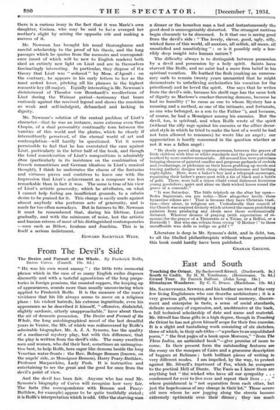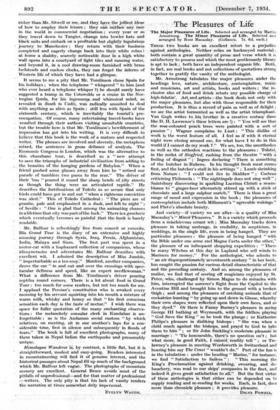East and South
MR. SACHEVERELL SITWELL and his brother are two of the very few living Endishmen who can describe architecture ; it is a very gracious gift, requiring a keen visual memory, discern- ment and enterprise in taste, a sense of social standards,
delicate accuracy of expression, and, unobtrusive at the back, a full technical scholarship of date and name and materiaL Mr. Sitwell has these gifts in a high degree, though in Touching the Orient he has not given himself scope for their free exercise. It is a slight and tantalizing work consisting of six sketches, three of which, in their sub-titles—" a preface to an unpublished poem," " the first pages. of a book upon Morocco," "from The Three Indies, an unfinished book "—give promise of more to come. In their present form the outstanding features are the essay on the mosques of Cairo and a gruesome description of beggars at Relizane ; both brilliant pieces of writing in very different modes. I am impelled, by the way, to protest against Mr. Sitwell's treatment of Fez, which he compares to the poetical Hell of Dante. The Fazis as I know them are anything but " the wicked who have all our sympathy . . .
condemned for ever to live over and repeat their lives . . . " where punishment is " not separation from each other, but
just the hopelessness of any change in their lot." Those serene old men whom he saw jogging along the streets become
eXtremely optimistic over their dinner ; they are much richer thati-Mr..Sitwell or me, and they have the jolliest ideas of how to employ their leisure ; they can Outface any race in the world in commercial negotiation ; every year or so they travel down to Tangier, change into bowler hats and black suits and embark on a profitable but slightly lugubrious - journey to Manchester ; they return with their business completed and eagerly change back into their white robes at home a shabby, scarcely noticeable door in a high white wall opens into a courtyard of light tiles and running water, - and beyond it, in a cool drawing-room furnished with brass bedsteads and cuckoo clocks, they can forget the inferno of Western life of which they have had a glimpse.
It seems to me a pity that Mr. Tomlinson chose Spain for his holidays ; when the telephone " whispered " to him (and who ever heard a telephone whisper ?) he should surely have suggested a tramp in the Cotswolds or a cruise in the Nor-
- wegian fjords, for his ingenuous and whimsical mind, as revealed in South to Cadiz, was radically unsuited to deal with anything as alien as Spain ; still less with Spain of the sixteenth century, which is inevitably the tourist's pre- occupation. Of course, many entertaining travel-books have
. resulted through their authors visiting unsuitable countries, - but the trouble here is that Mr. Tomlinson's bewilderment of impression has got into his writing. It is very difficult to believe that this book is the work of a mature and respected writer. The phrases are involved and slovenly, the metaphors
. mixed, the sentences in gross defiance of analysis. The Economic Congress in London, which was the alternative to this charabanc tour, is described as a " new attempt to save the triumphs of industrial civilization from adding to the beauties of the hanging gaidens of Babylon." When a friend pushed some glasses away from him he " retired our parade of tumblers two paces to the rear." The driver of
. their 'bus " poured it round the sharp bends of .city streets • as though the thing were an articulated reptile." He describes the fortifications of Toledo as so secure that only • birds could have got in and out "when a righteous conviction ' was alert." This of Toledo Cathedral : " The piers are of
- granite, pale and, emphasized in a dusk, and left to' night " ; of Seville : " One is glad that among the animating chances in a lifetime that city was part of the luck." There is a gaucherie which eventually becomes so painful that the book is barely readable.
Mr. Balfour is refreshingly free from conceit or conceits. His Grand Tour is the diary of an extensive and 'highly
_ amusing journey through Syria, Iraq, Persia, Afghanistan, India, Malaya and Siam. The first part was spent in a motor-car with a haphazard collection of companions, whose idiosyncrasies and adventures Mr. Balfour describes with excellent wit. I admired the description of Miss Jumble, • " imperturbable as a tea-cosy." Manfred, another companion, drove the car " in and out and over the crossings with spec- tacular deftness and speed, like an expert needletvoman."
• What a difference from Mr. Tomlinson's driver pouring
reptiles round corners. There is a lot about food in Grand Tour : too much for some readers, but not too much for me. I applaud the Persian's constitution who is awaked every morning by his servant squirting into his mouth a mixture of " warm milk, whisky and honey so that " his first conscious sensation each day is the taste of nectar." I wish there was space for fuller quotation of the many enchanting observa- tions : the melancholy consular clerk in Kandahar is un- forgettable ; as is the Andaman social custom " by which relatives, on meeting, sit in one another's laps for a con-
• siderable time, first in silence and subsequently in floods of tears." The book is full of excellent photographs, many of them taken in Nepal befOre the earthquake and presumably unique.
Himalayan Wanderer is, by contrast, a little flat, but it is straightforward, modest and easy-going. Readers interested in mountaineering will find it of genuine interest, and the historical passages about Nepal fill up much of the background which Mr. Balfour left vague. The photographs of mountain scenery are excellent. General Bruce avoids most of the pitfalls of unprofessional—and for that matter of professional —writers. The only pity is that his lack of vanity renders the narrative at times somewhat drily impersonal.
EVELYN WAUGH.



















































 Previous page
Previous page